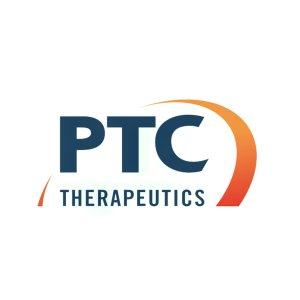PTC Therapeutics Announces Sepiapterin NDA Submission to FDA
Rhea-AI Summary
PTC Therapeutics (NASDAQ: PTCT) has submitted a New Drug Application (NDA) to the FDA for sepiapterin, targeting the treatment of phenylketonuria (PKU) in both pediatric and adult patients. The submission is based on significant results from the phase 3 APHENITY trial, which showed a 63% mean reduction in Phe levels overall and 69% in classical PKU patients. Notably, 84% of subjects achieved Phe control (<360 µmol/L) and 22% normalized Phe levels. The Phe tolerance sub-study revealed that 60% of subjects could increase protein intake while maintaining Phe control, potentially allowing for diet liberalization. Marketing applications for Europe are under review, with submissions for Japan and Brazil expected later in 2024.
Positive
- NDA submission to FDA for sepiapterin to treat PKU in all age groups
- Phase 3 APHENITY trial showed 63% mean reduction in Phe levels
- 84% of subjects achieved Phe control (<360 µmol/L)
- 60% of subjects in Phe tolerance sub-study achieved higher protein intake while maintaining Phe control
- Potential for diet liberalization in PKU patients
- Marketing applications in progress for Europe, Japan, and Brazil
Negative
- None.
News Market Reaction 1 Alert
On the day this news was published, PTCT gained 1.57%, reflecting a mild positive market reaction.
Data tracked by StockTitan Argus on the day of publication.
"This NDA submission is an important step in bringing this therapy to children and adults living with PKU in the
The sepiapterin NDA is based on the highly statistically significant and clinically meaningful results from the phase 3 APHENITY trial. The results demonstrate a mean reduction in Phe levels of
The European marketing authorization application is currently under review and the marketing authorization applications for
About Sepiapterin
Sepiapterin (formerly PTC923) is an oral formulation of synthetic sepiapterin, a precursor to intracellular tetrahydrobiopterin, which is a critical enzymatic cofactor involved in the metabolism and synthesis of numerous metabolic products. Sepiapterin is a more bioavailable precursor than exogenously administered synthetic BH4 and has the potential to treat the broad range of PKU patients.
About Phenylketonuria
Phenylketonuria (PKU) is a rare, inherited metabolic disease, which affects the brain. It is caused by a defect in the gene that helps create the enzyme needed to break down phenylalanine. If left untreated or poorly managed, phenylalanine – an essential amino acid found in all proteins and most foods – can build up to harmful levels in the body. This causes severe and irreversible disabilities, such as permanent intellectual disability, seizures, delayed development, memory loss, and behavioral and emotional problems. Newborns with phenylketonuria initially don't have any symptoms, but symptoms are usually progressive, and damage caused by toxic levels of phenylalanine in the first few years of life is irreversible. Diagnosis of phenylketonuria usually takes place during newborn screening programs. There are an estimated 58,000 people with phenylketonuria globally.
About PTC Therapeutics, Inc.
PTC is a global biopharmaceutical company focused on the discovery, development and commercialization of clinically differentiated medicines that provide benefits to patients with rare disorders. PTC's ability to innovate to identify new therapies and to globally commercialize products is the foundation that drives investment in a robust and diversified pipeline of transformative medicines. PTC's mission is to provide access to best-in-class treatments for patients who have little to no treatment options. PTC's strategy is to leverage its strong scientific and clinical expertise and global commercial infrastructure to bring therapies to patients. PTC believes this allows it to maximize value for all its stakeholders. To learn more about PTC, please visit us at www.ptcbio.com and follow us on Facebook, Instagram, LinkedIn and Twitter at @PTCBio.
For More Information:
Investors:
Kylie O'Keefe
+1 (908) 300-0691
kokeefe@ptcbio.com
Media:
Jeanine Clemente
+1 (908) 912-9406
jclemente@ptcbio.com
Forward-Looking Statement
This press release contains forward-looking statements within the meaning of The Private Securities Litigation Reform Act of 1995. All statements contained in this release, other than statements of historic fact, are forward-looking statements, including statements regarding: the future expectations, plans and prospects for PTC, including with respect to the expected timing of regulatory submissions and responses, commercialization and other matters with respect to its products and product candidates; PTC's strategy, future operations, future financial position, future revenues, projected costs; the extent, timing and financial aspects of our strategic pipeline prioritization and reductions in workforce; and the objectives of management. Other forward-looking statements may be identified by the words, "guidance", "plan," "anticipate," "believe," "estimate," "expect," "intend," "may," "target," "potential," "will," "would," "could," "should," "continue," and similar expressions.
PTC's actual results, performance or achievements could differ materially from those expressed or implied by forward-looking statements it makes as a result of a variety of risks and uncertainties, including those related to: the outcome of pricing, coverage and reimbursement negotiations with third party payors for PTC's products or product candidates that PTC commercializes or may commercialize in the future; expectations with respect to sepiapterin, including any regulatory submissions and potential approvals, commercialization, the potential achievement of development, regulatory and sales milestones and contingent payments that PTC may be obligated to make; significant business effects, including the effects of industry, market, economic, political or regulatory conditions; changes in tax and other laws, regulations, rates and policies; the eligible patient base and commercial potential of PTC's products and product candidates; PTC's scientific approach and general development progress; and the factors discussed in the "Risk Factors" section of PTC's most recent Annual Report on Form 10-K, as well as any updates to these risk factors filed from time to time in PTC's other filings with the SEC. You are urged to carefully consider all such factors.
As with any pharmaceutical under development, there are significant risks in the development, regulatory approval and commercialization of new products. There are no guarantees that any product will receive or maintain regulatory approval in any territory, or prove to be commercially successful, including sepiapterin.
The forward-looking statements contained herein represent PTC's views only as of the date of this press release and PTC does not undertake or plan to update or revise any such forward-looking statements to reflect actual results or changes in plans, prospects, assumptions, estimates or projections, or other circumstances occurring after the date of this press release except as required by law.
Acronyms:
FDA:
NDA: New Drug Application
Phe: Phenylalanine
PKU: Phenylketonuria
![]() View original content:https://www.prnewswire.com/news-releases/ptc-therapeutics-announces-sepiapterin-nda-submission-to-fda-302209443.html
View original content:https://www.prnewswire.com/news-releases/ptc-therapeutics-announces-sepiapterin-nda-submission-to-fda-302209443.html
SOURCE PTC Therapeutics, Inc.







